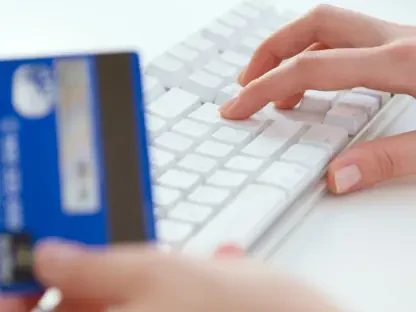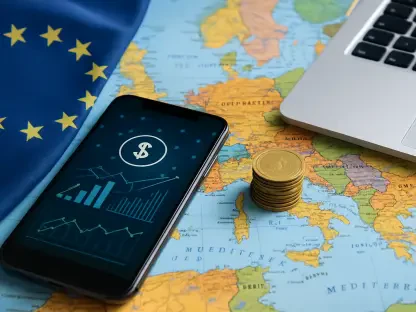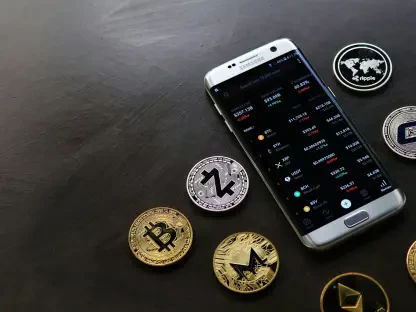Blockchain technology is ushering in significant enhancements to the safety and accessibility of online operations. Originally introduced in connection with cryptocurrencies like Bitcoin, blockchain is showing promise far beyond this initial use case. Its decentralized, immutable, and transparent nature offers potential across multiple industries to secure and streamline online processes. From enhancing security through decentralization to enabling transparent transactions and distributed applications, blockchain’s impact is far-reaching and transformative.
Enhanced Security through Decentralization
In traditional online systems, centralized databases are the norm, creating singular points of failure that are vulnerable to cyberattacks and data breaches. Blockchain disrupts this model with a decentralized framework, where no single node can compromise the entire system. Cryptographic techniques like hashing and key encryption further fortify the security. As a result, blockchain transactions remain immutable and tamper-proof, offering unprecedented levels of trust and reliability.
The decentralized nature of blockchain ensures that data is distributed across multiple nodes, making it nearly impossible for hackers to alter information without being detected. This distributed ledger technology (DLT) provides a robust defense against cyber threats, significantly reducing the risk of data breaches and unauthorized access. The distributed aspect of blockchain means that even if a single node is compromised, the system as a whole remains secure, as changes must be validated by a network consensus.
Cryptographic techniques implemented in blockchain add another layer of security. Transactions are encrypted and linked together in a chain, creating an immutable record that cannot be altered without changing all subsequent blocks. This makes blockchain not only highly secure but also transparent, as any attempt to tamper with data will be immediately noticeable to all participants in the network. Such security measures are particularly valuable in industries where maintaining data integrity is paramount, such as finance and healthcare.
Identity Verification and Fraud Prevention
Identity theft and fraud are significant concerns in our increasingly online-dependent world. Blockchain addresses this through decentralized identity verification, allowing users to control their personal information without needing third-party intermediaries. Self-Sovereign Identity (SSI) solutions enable users to secure their data and share it only when necessary, reducing risks of identity theft and enhancing privacy. For businesses, blockchain-based identity verification streamlines compliance processes like Know Your Customer (KYC) and Anti-Money Laundering (AML) while ensuring the integrity of identities.
This not only enhances security but also reduces the time and cost associated with traditional verification methods. By leveraging blockchain’s inherent security features, businesses can automate verification processes, cutting down on manual labor and reducing human error. The immutable nature of blockchain ensures that once an identity is verified, it cannot be tampered with, providing a higher level of trust and reliability in digital interactions.
For consumers, decentralized identity verification offers greater control over personal information. Instead of relying on multiple third-party services that may be vulnerable to data breaches, individuals can store their identity data on a blockchain. They can then share this information selectively, providing only what is necessary for a specific transaction or service. This not only enhances privacy but also reduces the risk of identity theft, as there is no centralized repository of personal data for hackers to target.
Secure and Transparent Transactions
Financial transactions online are often fraught with risks, including fraud, chargebacks, and inefficiencies. Relying on intermediaries in traditional banking introduces delays and extra costs. In contrast, blockchain enables secure, efficient transactions as exemplified by Bitcoin. Smart contracts—self-executing contracts with predefined conditions—eliminate the need for intermediaries, reduce transaction costs, and nullify the risk of chargebacks. The public ledger aspect of blockchain ensures transparency, allowing all parties to view transactions and thereby reducing disputes and fostering trust.
This transparency is particularly beneficial in industries where trust and accountability are paramount, such as finance and real estate. By providing a clear and immutable record of transactions, blockchain reduces the risk of fraud and ensures that all parties are held accountable for their actions. This level of transparency also streamlines regulatory compliance, as auditors and regulators can easily access transaction data without needing to rely on intermediaries.
Another significant advantage of blockchain-based transactions is the reduction of costs and delays associated with traditional banking. By removing intermediaries, transactions can be processed more quickly and at a lower cost. This is particularly beneficial for cross-border transactions, where traditional banking fees and delays can be prohibitive. With blockchain, international payments can be settled in near real-time, with minimal fees, making it an attractive option for businesses and individuals alike.
Supply Chain Transparency and Traceability
Blockchain significantly enhances supply chain management by offering immutable and transparent records that trace a product’s journey from supplier to shelf. This is transformative for industries where product integrity is paramount, such as pharmaceuticals, food production, and luxury goods. Consumers can now verify product authenticity by accessing detailed blockchain-stored records, boosting trust in the products they purchase.
The ability to trace products through every stage of the supply chain helps in identifying and addressing issues promptly, ensuring quality and compliance. This level of transparency also aids in combating counterfeit goods, protecting both consumers and brands. By providing a verifiable and immutable record of a product’s journey, blockchain can help ensure that products meet regulatory standards and are free from contamination or defects.
For businesses, the transparency offered by blockchain can lead to significant cost savings and efficiency improvements. By having a clear and accurate record of the supply chain, companies can better manage inventory, reduce waste, and optimize logistics. This can lead to lower operational costs and improved customer satisfaction, as products are delivered more reliably and with greater transparency.
Decentralized Applications (DApps) and Accessibility
Blockchain’s decentralized applications (DApps) offer increased security and control over traditional applications that run on centralized servers. DApps span various industries, including finance, healthcare, education, and content creation. Decentralized Finance (DeFi) platforms, for instance, provide financial services like lending and trading without traditional banks, benefiting those in unbanked regions. In healthcare, blockchain-based DApps ensure the secure sharing of medical records, maintaining patient privacy and improving interoperability between providers.
In education, blockchain is used to securely verify and share academic credentials, making it easier for students and professionals to prove their qualifications. The decentralized nature of DApps means that users have greater control over their data and can interact with applications without relying on centralized intermediaries. This reduces the risk of data breaches and increases trust in the security and integrity of the applications.
The use of blockchain in healthcare is particularly promising, as it addresses many of the challenges associated with secure data sharing and patient privacy. By storing medical records on a blockchain, healthcare providers can ensure that patient data is secure, tamper-proof, and easily accessible to authorized personnel. This can lead to improved patient outcomes, as providers have access to accurate and up-to-date information, and patients can have greater confidence in the privacy and security of their medical records.
Secure Communication and Data Sharing
As concerns around data privacy grow, blockchain offers a secure solution for communication and data sharing. Unlike traditional platforms that exploit user data without consent, blockchain enables peer-to-peer communication and decentralized storage. End-to-end encryption in blockchain-powered messaging apps eliminates reliance on centralized servers, thereby reducing the risk of data breaches. Distributed cloud storage further ensures data security by dispersing information across multiple nodes.
This decentralized approach to data storage and communication provides a higher level of privacy and security for users. By eliminating the need for central servers, blockchain reduces the risk of data breaches and ensures that user data remains private and secure. This is particularly important in an era where data privacy concerns are increasingly at the forefront of public consciousness.
The use of blockchain for secure communication has applications across a range of industries, from finance to healthcare to social media. By providing a secure and transparent way to communicate and share data, blockchain can help businesses and individuals protect their information and maintain control over their digital interactions. This not only enhances security but also fosters greater trust and confidence in online platforms.
Digital Rights Management (DRM)
Blockchain provides crucial benefits for content creators, musicians, and artists in protecting their intellectual property and securing fair compensation. Blockchain-enabled DRM solutions allow creators to record ownership and licensing details on an immutable ledger, thereby preventing unauthorized use and copyright infringements. Smart contracts can automate royalty payments, ensuring creators receive fair compensation whenever their work is used or shared.
This new approach allows creators to bypass traditional intermediaries, keeping a larger share of revenue and promoting a fairer business model. By recording ownership and licensing details on a blockchain, creators can ensure that their intellectual property is protected and that they are fairly compensated for their work. This is particularly important in an age where digital content can be easily copied and distributed without permission.
For consumers, blockchain-enabled DRM provides a transparent and fair way to access digital content. By ensuring that creators are fairly compensated, consumers can have greater confidence that they are supporting the artists and creators they love. This can lead to a more sustainable and equitable digital economy, where creators are rewarded for their contributions and consumers can access high-quality content knowing that their payments are supporting the creators.
Accessibility for Businesses and Consumers
Blockchain extends beyond security improvements by enhancing accessibility for both businesses and consumers. Traditional barriers such as bureaucratic inefficiencies and high costs can be circumvented with blockchain-based financial services, enabling broader participation in the global economy even without traditional bank accounts. Cryptocurrencies and stablecoins facilitate cross-border transactions with lower fees and faster settlements, benefitting freelancers and small businesses reliant on international payments.
Moreover, blockchain helps businesses enhance operational efficiency through process automation, paperwork reduction, and minimizing intermediary use. By streamlining processes and reducing reliance on intermediaries, blockchain can help businesses lower costs, improve efficiency, and operate more effectively in a global marketplace. This is particularly beneficial for small businesses and startups, which often face significant hurdles in accessing traditional financial services and global markets.
For consumers, blockchain offers new opportunities to participate in the global economy. By providing access to financial services and reducing transaction costs, blockchain can help individuals and businesses alike take advantage of new opportunities and markets. This can lead to greater economic inclusion and increased financial stability, as more people are able to participate in the global economy on their terms.
Final Thoughts
Blockchain technology is revolutionizing the security and accessibility of online operations. Initially developed for use with cryptocurrencies like Bitcoin, blockchain is proving to be a versatile tool that extends far beyond this original application. Due to its decentralized, unchangeable, and transparent characteristics, blockchain presents opportunities for securing and streamlining online processes across a variety of industries.
The decentralized nature of blockchain ensures that no single entity has control, which significantly enhances the security of data and transactions by limiting points of vulnerability. Furthermore, its immutable ledger means that once a transaction is recorded, it cannot be altered, providing a trustworthy record that can deter fraud and manipulation. This transparency is particularly beneficial in industries requiring verifiable, tamper-proof records, such as supply chain management, healthcare, and finance.
In addition, blockchain enables transparent transactions where all participants can see and verify each transaction. This level of transparency reduces the likelihood of errors or discrepancies and builds trust among users. Blockchain also supports distributed applications (often referred to as DApps), which can operate without a central authority, enhancing efficiency and reducing operational costs.
Overall, blockchain technology offers a transformative potential to enhance security, promote transparency, and optimize processes across numerous sectors, paving the way for a new era of digital efficiency and trustworthiness.









